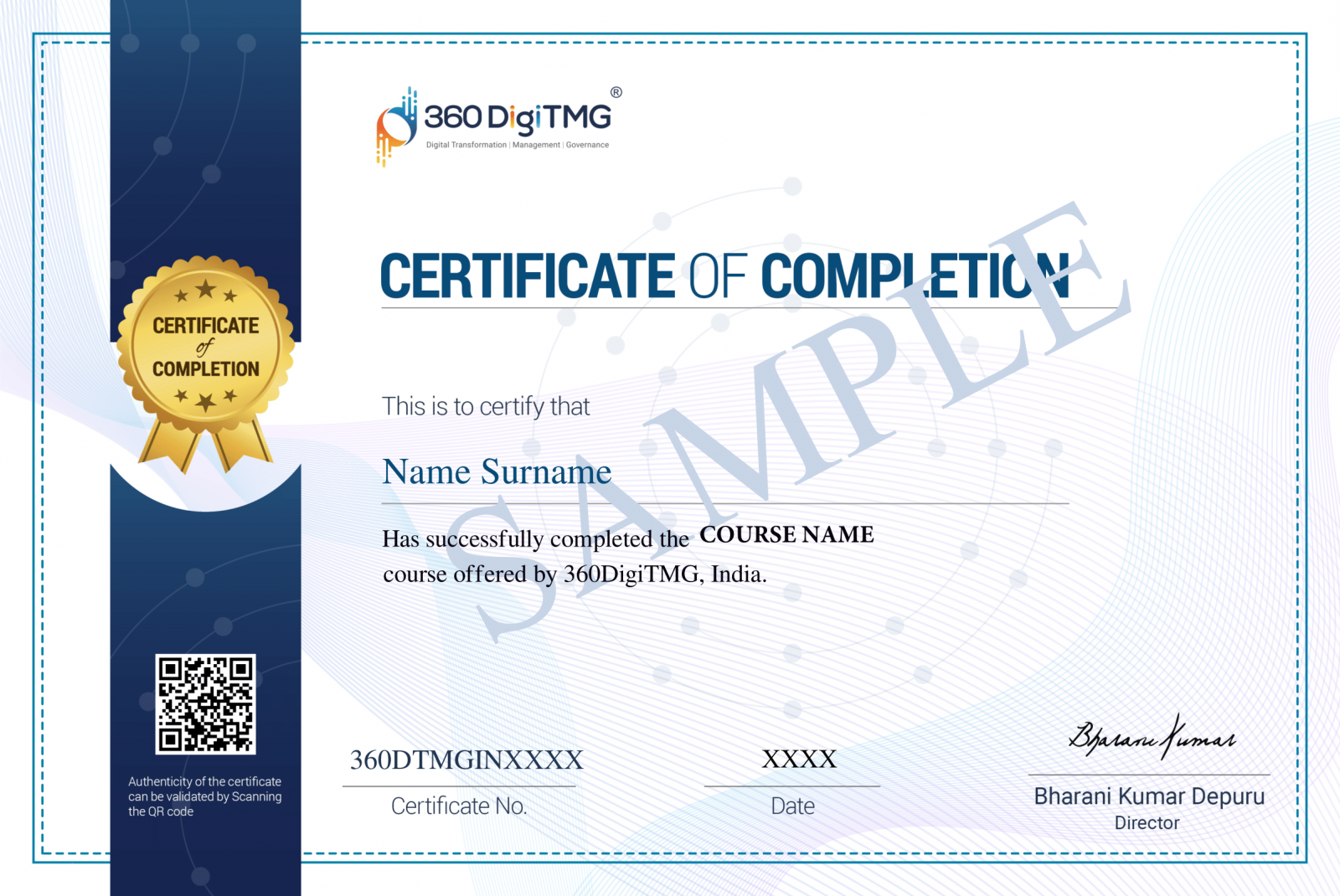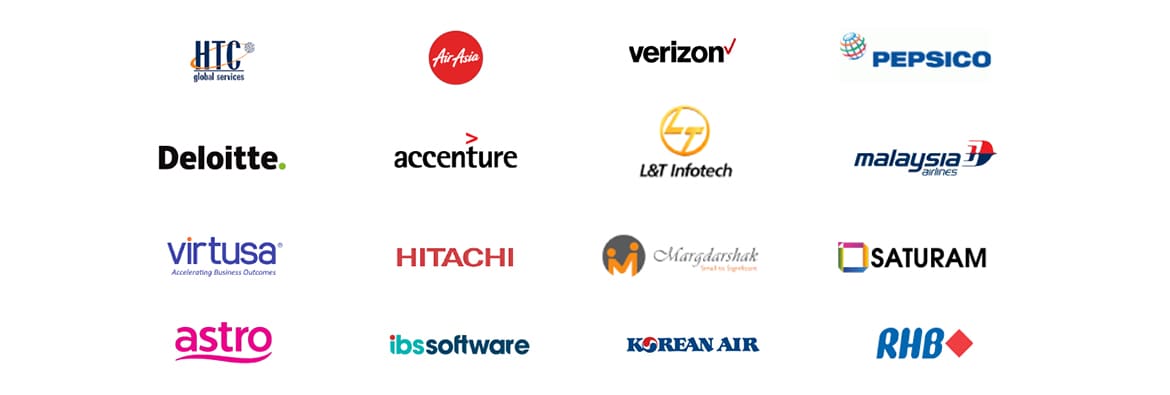Certified Information Systems Security Professional (CISSP)
- Get Trained by Trainers from ISB, IIT & IIM
- 40 Hours of Interactive Online Sessions
- 60+ Hours of Practical Assignments
- Job Placement Assistance
2,651 Learners
Academic Partners & International Accreditations
"CISSP certified professionals earn 30% more salary than the non-certified counterparts and this certification has been ranked at number 5 out of the top 15 highest paying certifications." - (Source). CISSP has positioned itself among the most esteemed and respected in-demand certifications in Information Security. This certification is awarded to deserving candidates by the International Information Systems Security Certification Consortium. This credential is looked upon as the "gold standard" in the world of security certifications. This certification validates your skills in planning the security program of your enterprise, improving the efficiency of security practices, tracking the performance of your organization, and identifying and managing its risks. For almost two decades this certification has been extremely popular and is considered the most sought-after security certifications and that speaks volumes of its worth. One of the other benefits of possessing CISSP certification is that it is recognized globally and fortune 500 companies like Google, Amazon P&G, IBM, etc. are always looking out for CISSP certified professionals.
CISSP Course Training Overview
The CISSP Certification is an ensemble of information security concepts and relevant topics that align with industry best practices of information security terms and principles. This course will cover all the 8 domains of the CISSP curriculum and will provide you with simulation test papers to prepare you for the CISSP examination. The International Information System Security Certification Consortium (ISC)² has taken the initiative to grant this premier certification to deserving candidates. This certification helps develop understanding in designing, running, and maintaining a secure IT infrastructure. You will be creating framework structures that utilize security works and give satisfactory assurance to framework capacities. This course will give you the ability to select the best security arrangements and structures to ensure system security during operations. This CISSP training is best suited for security managers, security practitioners, security system engineers, CIOs, and network architects. To qualify for this certification, you need to have 5 years of work experience in at least two of the 8 domains of the CISSP.
What does it mean to have a CISSP Certification?
The Certified Information Systems Security Professional (CISSP) is the most valued certification in the world. It acknowledges that you have what it takes to plan, engineer, and implement an information security program. This certification tests your expertise in 8 domains, including mobile device security, cryptography, application development security, security architecture & operations, cloud security, and risk management. The exam has 250 multiple choice questions which you have to complete in six hours. The various domains that you are tested on are Asset Security, Security and Risk Management Practices, Identity and Access Management, and is administered by the International Information System Security Certification Consortium (ISC)2.
Eligibility criteria
Experience - You have to provide proof of experience not less than five years in two or more security domains as prescribed in Common Body of Knowledge (CBK).If you do not have relevant experience you can still sit for the exam and if you clear then you can become an Associate which is a smart step towards a full CISSP.
To pass the Exam - The exam consists of 250 multiple choice questions and a duration of six hours is given to complete the exam and a candidate needs a score of 70% to pass this exam. These exams are conducted throughout the world and the exam schedules are available on the website.
Learning Outcomes of CISSP
If you are inspired to provide a safe and secure cyber world then go no further and advance towards getting a CISSP certification. This certification is among the top-tier information technology and information security certifications. This certification is proof enough that you are at the top of your game in terms of knowledge and experience. Today, there are more than 140,000 CISSPs in more than 170 countries and regions around the world but the demand in this field far outstrips the number of CISSP certificate holders. This course will help you explore all the eight domains and help you understand all aspects of the cybersecurity landscape from risk management to communication and from security testing and operations to network security. You will learn about the different kinds of threats that CISSP’s combat and how to interact with the overall organizational ecosystem. The students will also learn to create security architecture to protect the assets and ensure to provide availability, integrity, and confidentiality to the information. You will also learn to combat the threats, weaknesses, and implement countermeasures to protect sensitive information and physical resources of your organization.
Block Your Time
Who Should Sign Up?
- Internal Auditors
- CFO/Director/Head of Accounting
- Business Analysts
- Data Analysts
- Banking and Accounting Analysts
- Certified Financial Analysts
- Credit Analysts
- Financial Advisors
- Math, Science and Commerce Graduates
- IT Security officials, IT Admin (Network, Firewall, System Admin), IT professionals
- Mid-level Executives
- Information Security
- Information Law
Training Modules of CISSP
The modules of this course on CISSP certification will take you through all the 8 domains and introduce you to the IT infrastructure and security management. The first domain on Security and Risk Management will give you an overview of the principles that govern security. The second domain, Asset Security will introduce the physical assets of information security. The third domain, Security Architecture, and Engineering deals with the important concepts of security like Cryptography or Assessing vulnerabilities in systems. The fourth domain, Communication, and Network security will cover the design of the network. The fifth domain, Identity, and Access management throws light on how to control physical and logical access to assets. The sixth domain, Security Assessment, and Testing will focus on the performance and analysis of security testing. The seventh domain, Security Operations will address the way how security plans are put into action. The last domain, Software Development Security will help professionals understand Security in the software development life cycle. So, if you accelerate your career and are always up for a challenge then take your next step and get your CISSP certification.
- The CIA Triad
- IAAA
- Governance, Management, standards, and frameworks
- Laws and regulations
- Intellectual property
- US laws, European laws and international treaties
- GDPR (General Data Protection Regulation)
- Ethics
- Policies, procedures, guidelines, and frameworks
- Access control
- Risk analysis, attackers, and attacks
- Data classification and clearance
- Sensitive information and media security
- Mission, data, and system owners and data custodians
- Memory and data remanence
- Data remanence and destruction
- Data security frameworks
- Security models and concepts
- Security evaluation models
- Secure system design concepts
- Hardware architecture
- Secure operating systems and software architecture
- Virtualization
- IoT (Internet of Things)
- System vulnerabilities, threats, and countermeasures
- Web architecture and attacks
- Database security
- Mobile device security
- Industrial Control Systems
- Introduction to Cryptography
- The history of cryptography
- Symmetric encryption
- Asymmetric encryption
- Hashing
- Attacks on our cryptography
- Digital signatures
- IPSec and PGP
- MAC, HMAC, SSL, and TLS
- Physical security part 1
- Physical security part 2
- Physical security part 3
- Site selection
- Media storage
- Electricity
- Fire suppression and hot and cold aisles
- Personnel safety
- The fire triangle and fire suppression
- Networking basics and definitions
- The OSI model
- The TCP-IP model
- IP addresses and port numbers part 1
- IP addresses and port numbers part 2
- IP support protocols
- Cable types
- LAN topologies
- WAN protocols
- SAN and VoIP protocols
- WIFI
- Bluetooth
- Layer 1 to 3 networking devices
- Layer 3 routing protocols
- Firewalls
- Modems
- Network authentication protocols
- Secure communications
- Introduction to Access Control
- Type 1 authentication - "Something you know" or "Knowledge factors"
- Type 2 authentication - "Something you have" or "Possession factors"
- Type 3 authentication - "Something you are" or "Biometrics"
- Authorization
- Accountability
- Access control systems
- Identity and access provisioning
- Authentication protocols
- Domain 6 key concepts
- Security Assessments
- Security Audits
- Security Audit Logs
- Vulnerability scanners
- Penetration testing
- Social Engineering attacks
- Penetration testing tools
- Software testing
- key concepts
- Administrative personnel controls
- Digital forensics
- Spinning disk forensics
- Network and Software forensics
- Incident Management definitions
- Incident Management
- Intrusion detection and prevention systems
- SIEM (Security Information and Event Management)
- Application white-listing
- Honeynets and Honeypots
- Configuration Management
- Patch Management
- Change management
- 0-day attacks
- Backups
- RAID (Redundant Array of Independent Disks)
- Redundancy
- BCP and DRP
- Warfare, terrorism, sabotage, and ransomware
- Personnel
- DRP basics
- Developing our BCP and DRP
- BIA (Business Impact Analysis)
- Supply and infrastructure redundancy
- Disaster Recovery sites
- Other BCP sub plans
- Employee redundancy
- Testing the plans
- After a disruption
- Designing security into our software
- Programming concepts
- Software development methodologies part 1
- Software development methodologies part 2
- Databases part 1
- Databases part 2
- OWASP part 1
- OWASP part 2
- Software vulnerabilities and Attacks
- Capability Maturity Model (CMM)
- Buying software from other companies
- Artificial intelligence (AI)
Trends in Information Security
The cat and mouse game between data hackers and data defenders continues and is growing as more and more businesses rely on digital processes. Malware and Ransomware continue to be the major concern for companies who agree that security is important and are willing to invest in the need for new actions and strategies to mitigate the impact of a cyberattack. New models of technology like cloud computing and mobility that have created such drastic changes to process and IT architecture have also accelerated the importance of security. We will also get to see a Rise in Automotive Hacking as modern vehicles come with most advanced technologies like smooth cruise control of their vehicles, automatic door locks, advanced systems for driver assistance, Bluetooth, and WiFi technologies for seamless communication which opens them to threats from hackers. Artificial intelligence has brought tremendous changes in cybersecurity and is being used to develop smart malware and threat detection systems that can avoid data breaches instantly.
Among other trends in cybersecurity, mobiles have become new grounds for hackers and we need to bring our attention to this new target that has become a potential prospect for hackers who can get access to our photos, financial transactions, emails, etc. resulting in serious consequences for individuals. With more and more organizations moving to the cloud have increased the potential vulnerabilities and one needs to be more updated to safeguard the data from leaks which will be the primary goal for organizations around the world. A new era in IoT technology with a 5G network is expected to bring a plethora of network attacks that one needs to watch out for shortly. It is predicted that a total of 4 million Cyber Security jobs will be up by 2021 and the global Cyber Security market will reach USD 300 Billion by 2025. These trends point towards the judicious shifts in the security industry that will have a significant positive impact as well as a rise in the potential for disruption.
How we prepare you
-
60+ Hours of Practical Assignments

-
Live Free Webinars

-
Resume and LinkedIn Review Sessions

-
Lifetime LMS Access

-
24/7 Support

-
Job Placements Assistance in CISSP Fields

-
Complimentary Courses

-
Unlimited Mock Interview and Quiz Session

-
Hands-on Experience in a Live Project

-
Offline Hiring Events

Call us Today!

Certificate
This CISSP course rewards you with a certificate for your diligence and sustained endeavour. Demonstrate the skills that you have acquired in this course and win accolades from industry peers and superiors. The Data Science in CISSP Analytics Certificate is your passport to an accelerated career path.
Recommended Programmes
Data Science Certification Course

 2064 Learners
2064 Learners
Big Data using Hadoop & Spark Course Training

 3021 Learners
3021 Learners
Artificial Intelligence (AI) & Deep Learning Course

 2915 Learners
2915 Learners
Alumni Speak

"The training was organised properly, and our instructor was extremely conceptually sound. I enjoyed the interview preparation, and 360DigiTMG is to credit for my successful placement.”
Pavan Satya
Senior Software Engineer

"Although data sciences is a complex field, the course made it seem quite straightforward to me. This course's readings and tests were fantastic. This teacher was really beneficial. This university offers a wealth of information."
Chetan Reddy
Data Scientist

"The course's material and infrastructure are reliable. The majority of the time, they keep an eye on us. They actually assisted me in getting a job. I appreciated their help with placement. Excellent institution.”
Santosh Kumar
Business Intelligence Analyst

"Numerous advantages of the course. Thank you especially to my mentors. It feels wonderful to finally get to work.”
Kadar Nagole
Data Scientist

"Excellent team and a good atmosphere. They truly did lead the way for me right away. My mentors are wonderful. The training materials are top-notch.”
Gowtham R
Data Engineer

"The instructors improved the sessions' interactivity and communicated well. The course has been fantastic.”
Wan Muhamad Taufik
Associate Data Scientist

"The instructors went above and beyond to allay our fears. They assigned us an enormous amount of work, including one very difficult live project. great location for studying.”
Venu Panjarla
AVP Technology
Our Alumni Work At

And more...
FAQs for CISSP
A minimum of five years professional experience in security or two or more domains of CISSP. You can certify if you get a score of a minimum of 700 points and clear the eligibility criteria.
Anyone who wants to make it big in the information security domain knows the significance of this certification. Professionals who are security analysts and engineers with 5 years of experience working in the field of security and want to make advancement in their earning potential because this is the most sought-after and extremely popular IT security certification.
The level of difficulty is subjective and depends on how well one has prepared for the exam. You need a 70% score to clear the exam that has 250 questions and a duration of six hours is given to complete the exam. It’s tough to prepare and manage time but not impossible if one has a plan of action in place and follows it religiously.
The only way to clear this exam in the first attempt is through hard work and dedication towards this managerial exam. Be thorough with all the study material across all 8 domains and have an exam strategy in place. Plan your research work and acquire all the relevant study material and also have a clear understanding of the Code of Ethics as it is included in the exam. Join a training center that will give you theoretical as well as practical exposure.
There are 8 domains and their weightage are as follows
- Security and Risk Management-15%
- Security Architecture and Engineering- 13%
- Asset Security- 10%
- Identity and Access Management (IAM)- 13%
- Communication and Network Security- 14%
- Security Assessment and Testing- 12%
- Software Development Security- 10%
- Security Operations- 13%
With a CISSP membership, pros get many benefits of attending free webinars, discounts on (ISC)2 education, networking opportunities, recognition in the (ISC)2 global awards program, and discounts on events.
A training center is your best chance to clear the exam and 360DigiTMG, India helps candidates prepare for the exam by providing them expert-crafted content & interactive resources to guide them through every stage of exam preparation. The students are taught from a theoretical as well as a practical perspective.
To appear for the exam, you have to buy an exam voucher that costs $699.
There are 250 multiple choice questions spread across eight domains.
The CISSP certification is valid for three years and thereafter certain requirements have to be met to qualify for renewal like following the (ISC)² Code of Ethics, earning continuing professional education (CPE) credits, and finally paying the annual maintenance fee.

Jobs for a CISSP Certified Candidate
This certification proves that you have what it takes to effectively run the information security system of your organization. With this certification you can apply for high-profile IT and information security jobs like Security Architect, Network Security Specialist, Information Security Manager, Security Engineer, and many more.

Salaries in India for a CISSP certified candidate
This certification facilitates rapid advancements in the security field and is a CISSP professional that can lead to a higher pay package. As a certified CISSP, you can earn a salary between 2000,000Lakhs - 2,500,000 Lakhs per annum in India.

Projects in the field of Information System security
There are many interesting information security projects for candidates who wish to improve upon system security practices. One can work on projects like detecting data leaks, automated attendance system, facial recognition, detecting online transaction fraud, etc.

Role of Open Source Tools in Information System Security
Open source is a major part of system security. Open source tools ensure the confidentiality, integrity, and availability of information. They also ensure organizations and users can fight against cyber threats. These tools are also used for security assessments, and for managing wireless network communication.
Modes of training for CISSP Certification
The course in India is designed to suit the needs of students as well as working professionals. We at 360DigiTMG give our students the option of online learning. We also support e-learning as part of our curriculum.

Industry Applications of Information System Security
CISSP professionals are in demand in many public and private organizations, including fortune companies, big accounting firms, retail industry, government agencies, healthcare sector, and the Department of Defense.
Companies That Trust Us
360DigiTMG offers customised corporate training programmes that suit the industry-specific needs of each company. Engage with us to design continuous learning programmes and skill development roadmaps for your employees. Together, let’s create a future-ready workforce that will enhance the competitiveness of your business.





Student Voices










 +91 9989994319
+91 9989994319













